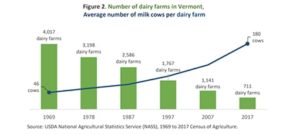$285 million spent from 2010-2019, auditor’s report finds
Vermont State Auditor Doug Hoffer released a first-ever comprehensive accounting of Vermont state government’s total annual spending in support of Vermont’s dairy industry, Monday, May 10. From state fiscal year 2010-2019, the auditor’s office estimates that Vermont taxpayers spent more than $285 million on programs and policies to support the dairy industry and/or address adverse environmental impacts caused by some dairy practices. In fiscal year 2019, the most recent year of the analysis, spending totaled more than $35 million.

The number of dairy farms in Vermont has dropped from 4,017 farms in 1969 to 636 in 2020, but the size of the average dairy farm’s herd grew. In 1969, the average farm had just 45 cows, by 2017 the average herd grew to 180 cows.
“Every Vermonter knows the important historical contribution dairy farming has made to our state’s economy and identity,” said Auditor Hoffer. “We also know the last few decades have been extremely challenging for small- and mid-sized dairy farms. Below-cost payments from milk processors, industry consolidation, water quality requirements — these and other pressures help explain why Vermont went from 4,017 farms in 1969 to fewer than 650 today.
“As the state’s accountability office, my team and I engaged in this analysis to provide a comprehensive look at how taxpayer funds are being used to support the dairy industry and increasingly, to address the environmental impacts of dairy farming. We hope that this report will serve as a baseline for state government leaders and the public as they consider the future of Vermont’s dairy industry and what role public funds should play.”
The largest financial benefits to dairy farmers come from tax policies and benefits, specifically, exemptions to the sales tax and reductions in property taxes through the current use program. While spread across many programs, grants related to dairy’s environmental impacts are also sizable and have grown in recent years, particularly with the implementation of Vermont’s Clean Water Initiative.
Hoffer added: “The Legislature and the Executive branches each recognize the challenges facing Vermont dairy, and have initiated a series of efforts to re-imagine the future of Vermont dairy. As they consider the state’s role in that future, it’s critical for them, and for the public, to know how much taxpayers expend today to support the industry. My office completed this important work to the create an accountable role for the state moving forward.”
Steven Collier, general counsel for the Agency of Agriculture, commented on the report saying, “When you consider, at least in our view, how important dairy is and agriculture is in Vermont, and you think about how its annual economic activity is $2.2 billion, what we’re investing in dairy is not very much money,” he said.
Beyond the economic impact, farming is a huge part of Vermont’s identity as a state, especially in rural areas, Collier said. “It’s also important to remember that agriculture isn’t an optional industry, but rather a necessity for people’s collective survival.”




